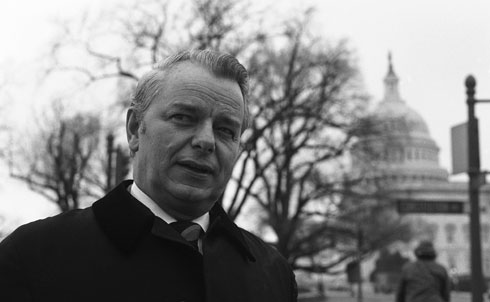
Senator Robert C. Byrd, who passed away Monday, June 28 at the age of 92, turned away from the unholiest of beginnings to a very long career as one of Congress’s greatest Constitutional champions. As The Nation‘s John Nichols argues, "America’s journey was Byrd’s journey. Indeed, Byrd’s transit of the arc of history provides one of the most redemptive stories of this nation’s progress."
A member of the Ku Klux Klan in his youth and a segregationist when first elected to Congress in 1952, Byrd slowly evolved over the following half-century, repudiating his racist past to eventually endorse Barack Obama in 2008. He had become an outspoken critic of unchecked executive power and, following the invasion of Iraq, declared on the Senate floor in May of 2003, "it appears to this senator that the American people may have been lured into accepting the unprovoked invasion of a sovereign nation, in violation of longstanding International law, under false premises."
Credit: AP Images

Byrd was committed to his home state of West Virginia, some would say to a fault, bringing in billions of dollars of earmarks to the impoverished Appalachian coal towns that sent him back to Washington for more than fifty years.
Credit: AP Images
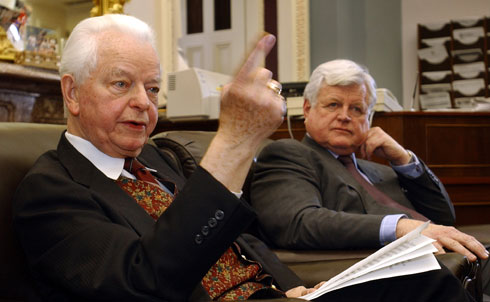
Byrd was one of the earliest and toughest critics on the US’s decision to invade Iraq, even among Democrats, who were largely complacent or supportive of the use of military force following the attacks of September 11. He had supported the Vietnamese mission of Presidents Johnson and Nixon and, like many senators who made the same mistake, he had come to recognize the importance of asserting a congressional check and balance on presidential warmaking. "Thanks to Byrd’s fierce denunciations of an unnecessary resolution to promote an unnecessary war," John Nichols wrote in October of 2002, "Members of Congress who side with the administration will not be able to plead ignorance to the charge that they abandoned their Constitutionally-mandated responsibilities in order to position themselves for the fall election."
Credit: AP Images

Two months after the fall of Baghdad, Byrd took to the Senate floor and drilled verbal holes into what had been Bush’s central argument for waging war in Iraq—Saddam Hussein’s alleged possession of Weapons of Mass Destruction. Byrd’s compelling words were published in an issue of The Nation: "With each passing day, the questions surrounding Iraq’s missing weapons of mass destruction take on added urgency," Byrd said. "Where are the massive stockpiles of VX, mustard and other nerve agents that we were told Iraq was hoarding? Where are the thousands of liters of botulinim toxin? Wasn’t it the looming threat to America posed by these weapons that propelled the United States into war with Iraq? Isn’t this the reason American military personnel were called upon to risk their lives in combat?"
Credit: AP Images
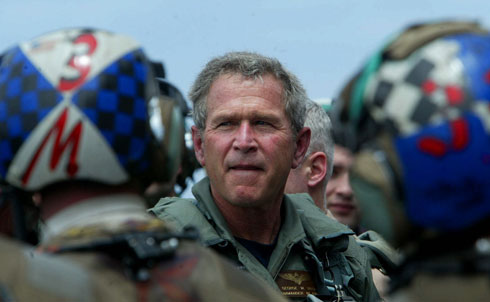
Byrd consistently pointed out the error of the Bush Administration’s ways following the September 11 attacks with incredible clarity and candor, saying what most were afraid or incapable of saying. Looking back, seven years later, his foresight seems remarkable. "One has to stop and ponder. How could we have been so impossibly naive?" he asked in a 2003 Senate speech published in The Nation. "How could we expect to easily plant a clone of US culture, values and government in a country so riven with religious, territorial and tribal rivalries, so suspicious of US motives and so at odds with the galloping materialism that drives the Western-style economies?"
Credit: AP Images
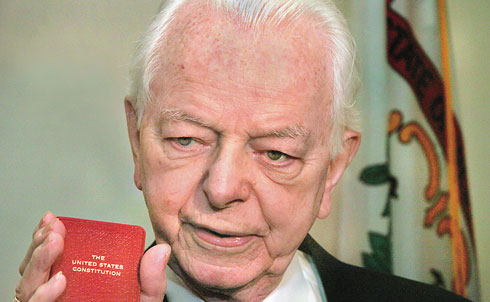
But Byrd did not lose sight of the significant battles to be fought on the homefront either: "We cannot continue to commit billions in Iraq when our own people are so much in need, not only now, in New Orleans, but all across America for everything from education to health care to homeland security to securing our own borders," Byrd said in September 2005 on the Senate floor. "It is time to come home, America. Time to look within our own borders and within our own souls."
Credit: AP Images
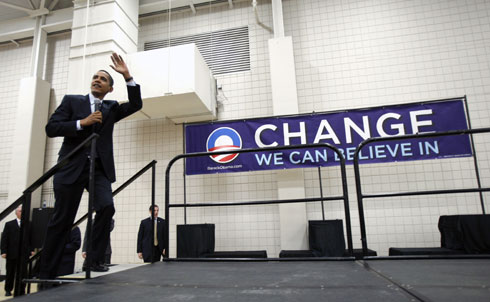
In 2008, Hillary Clinton took West Virginia’s Democratic primary by a landslide. But Byrd’s endorsement went to Illinois Senator Barack Obama, who Byrd called "a shining young statesman, who possesses the personal temperament and courage necessary to extricate our country from this costly misadventure in Iraq, and to lead our nation at this challenging time in history." Far removed from the hate-fueled associations of his past, Byrd emerged as a strong ally of the first African-American president in US history.
Credit: Reuters Pictures
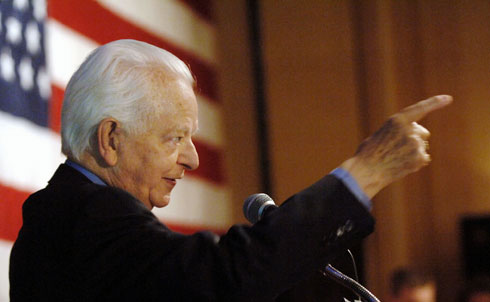
In recent years, Congress’s battles have often hinged on Byrd’s vote, which in turn has too often hinged on his health. But in the Senate’s final vote on healthcare in December of last year, Byrd made his way by wheelchair through a blizzard to cast the necessary 60th vote in favor the Democrats needed to pass reform.
The healthcare battle proved to be one of Byrd’s last in the senate, but it marked an important milestone in a long and varied life of a committed public servant.
Credit: AP Images


